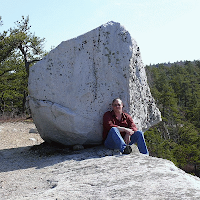More self-promotion. Yesterday I posted about two of the online courses I'll be teaching this summer and fall. Today, I will mention two of the in-person (face-to-face) courses I'll be teaching in the classroom (actually, in the field). Both of these courses are available to interested community members as well as our students.
The first is during our Summer Session 2 and runs for 8 days (July 5 - July 8 & July 11 - July 14) from 8:30 am to 5:30 pm. It's ESC-223-16 Field Course in Earth Science: Geology of the Hudson Valley. It's a 3 credit course (even though it's only 8 days) and is taught entirely in the field. Of all the courses, I teach, this is my favorite.
Basically, we meet each day at the campus, get into a college van or two, and drive to some interesting geological area between Manhattan in the south and Saratoga Springs in the north. Some days we hike, other days are along roadcuts and in city parks, and sometimes we even go down into natural caves and explore abandoned iron and natural cement mines. You'll have the opportunity to collect some interesting minerals, rocks, and fossils and will take lots of photos from scenic vistas atop the Shawangunks, Hudson Highlands, and Catskills.
Here's a website telling more about the course.
Registration in this class is limited to 18 students (the number that can fit into two vans) so if you're interested, sign up as soon as you can. Also be aware that to take this class, you'll have to be able to do a little hiking (nothing extremely strenuous, but a few miles each day are common).
The next course is meeting on Thursday nights from 7:00-10:00 pm during the fall semester from September 8 to November 10 - AST-103-51B Observational Astronomy. This is a blended course meaning some of the course material is delivered in an online format requiring access to a computer and the Internet. This is very much a hands-on course requiring time outside at night where you'll have the opportunity to learn how to use a telescope to find objects in the night sky.
Here's the course description:
This night course is a hands-on introduction to observing the night sky, how to locate these objects using celestial coordinate systems, and how to utilize the Internet and computer programs to obtain astronomical information. Most of the laboratory time will be spent outdoors learning the names and locations of stars and constellations and utilizing the department's telescopes to observe and study the moon, planets, deep sky objects, and other astronomical objects which might be visible. The course will include observing trips during class time to local areas away from the light pollution on campus.
So if you ever wanted to know how right ascension and declination worked, how to identify and locate planets, stars, or constellations in the sky, how to use a telescope, and if your idea of fun on a summer night is going up and looking at the sky, this course is for you.
How can you find out more about these courses? Email me with any content questions (there's a link in the left sidebar of my blog). For questions about how to register or what the tuition and fees will be, contact the Registrar's Office at SUNY Ulster County Community College.
Thursday, March 31, 2011
Subscribe to:
Post Comments (Atom)





No comments:
Post a Comment